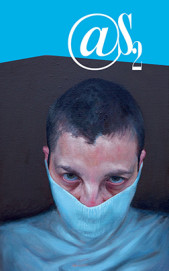 Desmond Kon Zhicheng-Mingdé
Desmond Kon Zhicheng-Mingdé
Red Wheelbarrow Books ($19.50)
by Mandy Pannett
The Arbitrary Sign is a poetry sequence that follows the shape of an alphabet; the symbols of twenty-six letters are used as title headings for the keywords of complex philosophical thoughts. If this sounds heavy, know that Desmond Kon Zhicheng-Mingdé’s poems are so rich in imagery, so neatly structured with the juxtaposition and compression of metaphors, that one can read the book with increasing pleasure without an erudite knowledge of the background.
The title The Arbitrary Sign comes from the writings of Ferdinand de Saussure, who believed there was no necessary connection between a symbol and its meaning, but while ideas behind linguistics are important here, this is really a book about encounters and connections—a labyrinth of passages of thought which, like the poems, may come to sudden or inconclusive ends. The look of the book, with its black pages between each section, lends itself perfectly to this, as does the unpunctuated, lower case form where meanings shift into ambiguity depending on how one reads each phrase. “beyond and beneath / the text,” says the author, “are its “inside and outside / all wound up together then dispersed.”
The central concept behind this sequence is Gilles Deleuze’s idea that everything is of one substance and on the same level of existence; although there are repetitions and simulacra nothing is ever identical, and with constant change reality is not a matter of being but of becoming. Underlying and underpinning this concept is the image of the rhizome. “because ginger candy is sweet / and so is the rhizome of deleuze and guattari / which reads like a big prank of a tome / or the roar of an opus of crackling laughs.” Prank or not, this is a fitting image to suggest connections, for the rhizome, like a labyrinth, is below the surface, may follow shortcuts or detours, and can shoot off in confusing and unforeseen directions.
Other images and allusions create atmosphere and enrich context. One of the strongest is the reference to Francis Bacon and his “bloodied history;” the poet devotes a section of his book to describing the “desire / to escape from one’s own body / its frame and bones and beating pulse / no less a prison than these four walls /we call home or an abode or comfort.” The philosophies of Jacques Lacan also have their part in The Arbitrary Sign, such as the idea that there is only a certain amount of pleasure a subject can bear; the poet sums this thought up in one neat image as “a limit to true enjoyment / so much you removed the chocolate / from the pudding and left / as little to enjoy as possible.”
This is a rich and fascinating poetry collection—elusive in that “no two things like utterances / are completely alike” and poignant too, because the last word is “dissipation.” We are left wondering if our lives are “a series of accidents” or if there is “something left of the vase of peonies,” something “post theory and naked,” a sense of quietude “before the tunnelling and the orbs tumble.”
